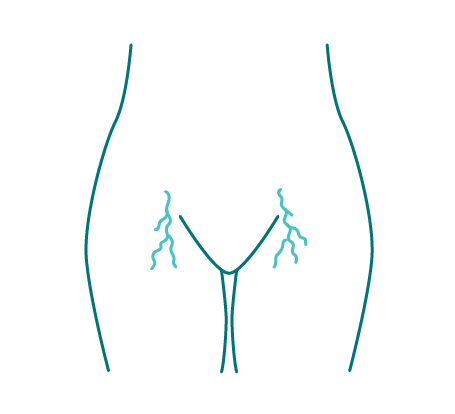If you are suffering from chronic pelvic pain, you may have Pelvic Venous Congestion Syndrome (PVCS) and require medical treatment.
Symptoms of Pelvic Venous Congestion Syndrome?
You may be suffering from Pelvic Venous Congestion Syndrome if you experience three or more of these symptoms:
- Pelvic pain
- Urinary urgency
- Frequent need for urination during sleep
- Painful intercourse
- Painful legs and pelvis related to your period (menstruation)
- Painful legs and pelvis exacerbated by pregnancy
- Varicose veins in the vulva
- Recurring varicose veins in the leg
- Pain in the thighs and buttocks
- A dragging feeling in the pelvis
- A sense of fullness or heaviness in the legs
- Irritable bowel
Why Vascular Ultrasound Matters?
If you’ve been experiencing persistent pelvic pain that seems to have no clear cause, you’re not alone—and you’re not imagining it. For many women, especially those who have had children, a little-known condition called PVCS may be to blame.
Let’s break down what this condition is, how it’s diagnosed, and why a test called a vascular ultrasound plays such a critical role in getting answers—and finding relief.
What is Pelvic Venous Congestion Syndrome?
Pelvic Venous Congestion Syndrome is a condition where the veins in the pelvis—especially those near the ovaries—become enlarged and don’t drain blood properly. This can lead to a feeling of heaviness, aching, or throbbing in the lower abdomen or pelvis. The pain is often worse:
- After standing for long periods
- At the end of the day
- During or after sex
- Before your period
These symptoms can be frustrating and are sometimes mistaken for other issues like endometriosis, irritable bowel syndrome (IBS), or even anxiety. That’s why getting the right diagnosis is so important
How is PVCS diagnosed?
One of the most valuable tools in diagnosing PVCS is a vascular ultrasound, also known as a duplex ultrasound. Unlike regular ultrasounds used during pregnancy or to look at organs, vascular ultrasound focuses specifically on blood flow in the veins.
This test is non-invasive, doesn’t involve radiation, and is completely safe. A vascular sonographer uses a small device (called a probe) with gel on your skin to view your veins in real-time. It allows doctors to:
- See if your pelvic veins are dilated (stretched)
- Check if blood is flowing in the wrong direction (called “reflux”)
- Identify vein blockages or other abnormalities
In some cases, additional imaging such as an MRI or CT scan may be needed, but vascular ultrasound is typically the first and most important step in confirming a diagnosis of PVCS.
While Vein Doctors Group does not provide treatment for PVCS, we work closely with Australian Ultrasound Specialists (AUS), whose expert team performs detailed vascular ultrasounds at our clinics. If signs of pelvic venous congestion are identified, AUS can facilitate a referral to a vascular surgeon for further assessment and treatment as needed. This collaborative approach ensures patients receive timely and accurate diagnoses from trusted professionals.
Is there a link between Postural Orthostatic Tachycardia Syndrome (POTS) and Pelvic Venous Congestion Syndrome?
POTS is characterized by an abnormal increase in heart rate upon standing, often leading to symptoms like dizziness, fatigue, and light-headedness. PVC, on the other hand, involves venous congestion in the pelvic area, which can cause pain, swelling, and other discomforts
Studies suggest that a significant percentage of POTS patients may also have venous compression issues in the pelvis, potentially worsening POTS symptoms. This connection is particularly noticeable in individuals with Ehlers-Danlos Syndrome (EDS), where co-existing conditions like May-Thurner syndrome (compression of the left common iliac vein) can contribute to PVCS and impact POTS.
Vascular ultrasound is also an important diagnostic tool in evaluating patients with suspected POTS.
Why Early Diagnosis Matters?
Living with unexplained pelvic pain can take a toll—not just physically, but emotionally. Left untreated, PVCS can worsen over time and impact quality of life. But with an accurate diagnosis, there are effective treatment options available, including minimally invasive procedures that can significantly reduce or eliminate symptoms.
That’s why it’s important to listen to your body and speak up if something doesn’t feel right—especially if you’ve been told “everything looks normal” but the pain persists.
If you’re struggling with unexplained pelvic discomfort or have questions about your vein health, book a consultation with Vein Doctors Group today and take the first step toward feeling better.










